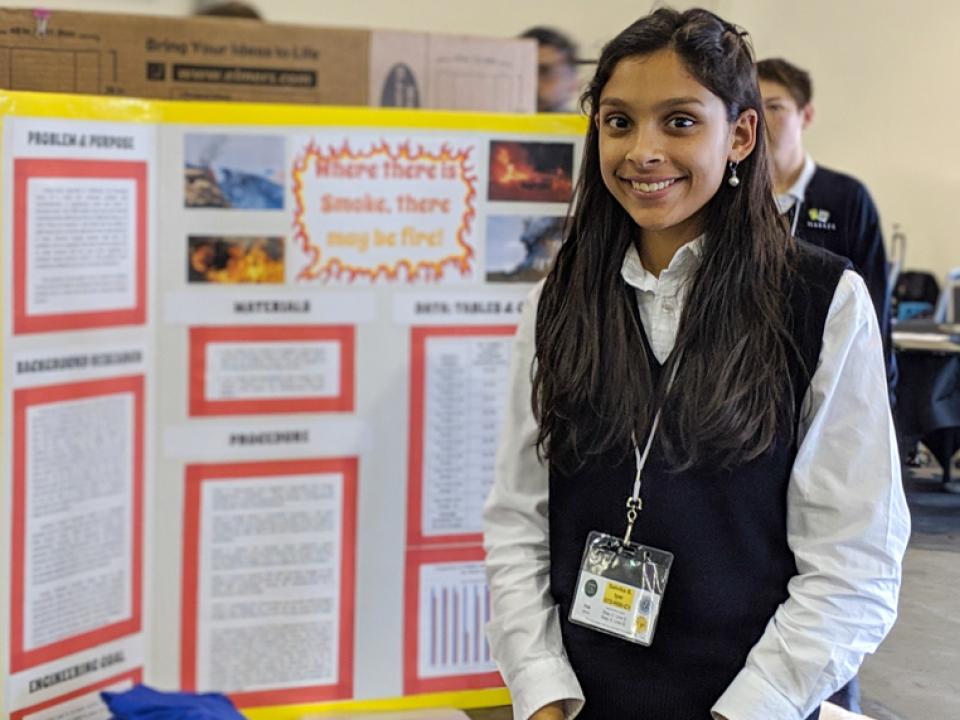(October 20, 2023) “Our school’s lunch menu lacked diversity in all aspects, and I couldn’t believe that the same five ingredients seemingly rotated into different meals somehow met the guidelines for a balanced meal,” says Indian-American teen Satvika Iyer, who was keen to create a healthy and sustainable food system in schools by advocating for more plant-based nutrition and better waste management. The campaign earned the Milpitas High School student 2023 International Young Eco-Hero Award. “The US government continues to subsidise systems that are inefficient and exploitative. Factory farming is one of those systems. As a high school student, I decided to break free from the ‘business as usual’ model of school food by taking a few small steps with the help of my school’s cafeteria and nutrition staff, and it led to a rewarding and lasting impact,” she said in an interview.

Satvika Iyer
Born to immigrant parents, Satvika had a hard time growing up as a vegetarian in California, and during lunchtime in school, she was asked to take pepperoni off the pizza. Despite her school catering to a 70 percent Asian population, they had only one Asian salad on the menu before featuring more plant-based options. This led to reaching the administration in her district with more plant-based options in school lunches, which set the ball rolling. “We began a district-wide Earth Day campaign to educate elementary, middle, and high school students about how and why choosing the plant-based option at school is important for combating climate change. We got incredible support from our cafeteria manager for the project,” she added as the campaign has helped serve over 2000 vegan lunches in the last year in the school.
They initially came up with a plant-based pitstop decked out with colourful posters in one corner of the cafeteria, but it gave an impression “that a plant-based meal was different from one with meat.” However, after feedback to the nutrition services staff about the placement of the plant-based options in the cafe, they were able to integrate it with a full-time cafeteria. “This experience shows that a high school cafeteria might need to be organized differently to support student participation in climate-friendly food options, and it’s our job to be flexible and try new things,” she added.


However, changing the perception of high schoolers on what they eat wasn’t a “walk in the park” as many opt for beef tacos daily. “Resistance to eating more plant-based food is usually coupled with being uninformed on the nutritional and ethical values that different foods offer,” the Global Indian said.
When asked why would school students opt for climate-friendly food, the eco-warrior said, “From an environmental standpoint, the amount of water and greenhouse gas emissions saved by choosing one plant-based meal over a meat and dairy-based entree in your cafeteria is significant.” That’s not it! Even from an ethical point of view, “each conventional beef patty represents the cruel, inhumane practices of industrial animal agriculture. The price we pay for seemingly ‘cheap’ industrial meats is animal cruelty.”
The campaign helped Satvika’s school district to introduce a permanent plant-based menu with meat-free alternatives and salad bars, in turn making a significant impact on school nutrition at her high school. The teenager, who believes that science and education can help solve global issues, shares friendly advice with other students who plan to tread a similar path. “Confront any fear with action. Instead of being overwhelmed by the daunting task ahead of you, celebrate the little wins. From reaching fellow students, finding plant-powered regulars, educating others, volunteering to help distribute meals, or even getting someone to try something from the plant-based menu just once — these are all wins and signs of progress!”
- Follow Satvika Iyer on LinkedIn




